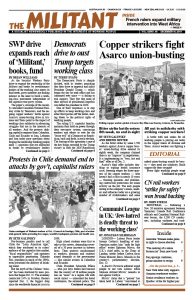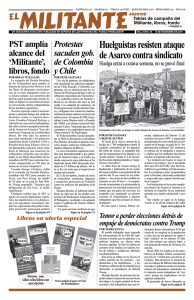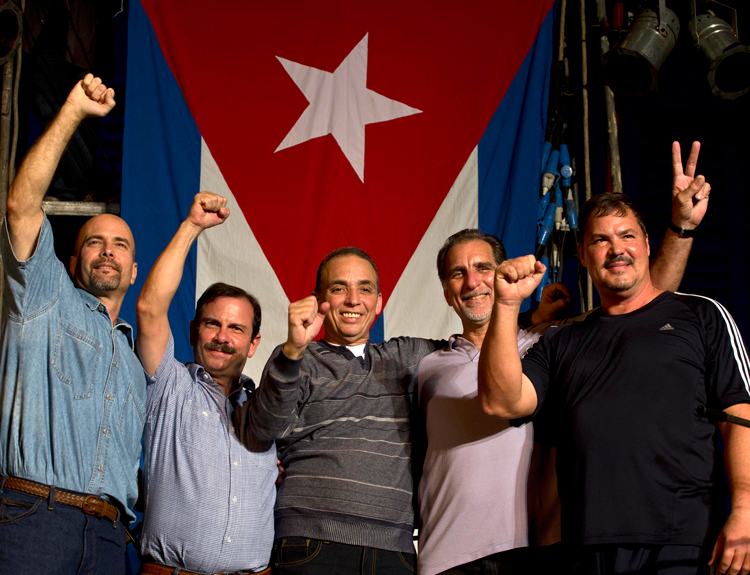Cuba and the Coming American Revolution by Jack Barnes, national secretary of the Socialist Workers Party, is one of Pathfinder’s Books of the Month for December. The book is about the struggles of working people in the imperialist heartland, the youth who are attracted to them and the example set by the people of Cuba that revolution is not only necessary — it can be made. The excerpt is from the foreword by Mary-Alice Waters, a leader of the SWP. She quotes Ramón Labañino, who was freed along with his other Cuban Five compatriots in December 2014 after a decade and a half in U.S. prisons for efforts to defend the Cuban Revolution. Copyright © 2001 by Pathfinder Press. Reprinted by permission.
This is the world in which the example set by the people of Cuba remains as important as it was the day they took power, demonstrating in practice what it takes to break the stranglehold of imperialist exploitation and defend those conquests. Explaining that truth to workers and farmers in the United States as they find themselves propelled into struggles that lead them to rethink many long-held prejudices in quite unexpected ways is not simply an act of working-class solidarity, however important that may be. It is a proletarian necessity, essential to the internationalist political education and transformation of the working class itself. As the Cuban people proudly say of their aid to the peoples of Africa, Latin America, the Caribbean, and elsewhere around the world, “Those who are not ready to fight for the freedom of others will never be ready to fight for their own.”
Shortly before Cuba and the Coming American Revolution came off the press in 2001, Colin Powell, the new secretary of state, explained Washington’s uncompromising stance toward Cuba’s revolutionary government. He did so more accurately than he perhaps intended. Testifying April 26, 2001, before a congressional committee, he responded to the question of why the U.S. government refuses to alter its decades-long policy toward Cuba. Powell replied that in China, Russia, and Vietnam “you can see leaders who the world is changing.” But in Cuba, he said, Castro “hasn’t changed his views in any way.”
The secretary of state got it only partially right, of course. As with each of his predecessors, his inability to fathom the human beings driving the Cuban Revolution was above all a class blindness. It is not only Fidel and the broad and deep revolutionary leadership of Cuba who have not changed their revolutionary convictions. It is the people of Cuba in their overwhelming majority who have never surrendered. Who refuse to subordinate the interests of working people to the prerogatives of capital. Who stand ready, as always, to aid revolutionary struggles wherever they may occur, by any means necessary. Whose message to would-be invaders remains the same as at Playa Girón: If you come, you stay.
The most important response to Cuba and the Coming American Revolution has been among new generations of readers who discovered something unanticipated in its pages. Those new readers, we are honored to say, included U.S. Federal Prisoner #58734-004, Ramón Labañino Salazar, one of Pathfinder’s many readers behind bars, and one of five heroes of the Cuban Revolution who has been imprisoned in the United States now for nine years. Like his comrades-in-arms Gerardo Hernández, Antonio Guerrero, Fernando González, and René González at the time of their arrest in September 1998, Ramón was living and working in the United States, tracking the activities of Cuban counterrevolutionary organizations that operate with impunity here, and providing the Cuban government with advance notice, when possible, of their murderous plans for sabotage and armed actions against the Cuban people. He was framed and convicted on charges of acting as an unregistered agent of a foreign power and conspiring to commit espionage. In what can best be called an act of political retribution aimed at punishing the Cuban people for their continuing revolutionary defiance of Washington’s demands that they “change,” he was handed a life sentence, which he is currently serving in U.S. federal prison in Beaumont, Texas.
After reading the foreword by Jack Barnes to Playa Girón/Bay of Pigs: Washington’s First Military Defeat in the Americas, reprinted here as “1961: Year of Education,” Ramón wrote to express his appreciation. While he had read numerous books and documents about Playa Girón, Ramón said, in this one he had learned something he “had never read in any other book on this subject.” For the first time, he noted, he had a feel for “the direct influence of the Cuban Revolution, its example and impact, on the people of the U.S., and on the education of the revolutionary left movement and the movement in solidarity with our country.” It gave evidence once again, Ramón added, “that our peoples are fraternal and invincible.”
Many young readers in the U.S. reacted similarly to learning how a previous generation of young socialists here in the United States had waged an intense political battle in defense of the Cuban Revolution in the weeks leading up to, during, and after the Washington-organized invasion in 1961. This previously unrecorded chapter in the history of the communist youth movement was to its continuators today not just an interesting account of something long past. It has become a model of mass work to be emulated, a guide for action today. …
When Fidel Castro defiantly announced to the world on March 13, 1961, that “there will be a victorious revolution in the United States before a victorious counterrevolution in Cuba,” he was not gazing in a crystal ball, or engaging in verbal bravado. Nor did those of us whose political lives began in those days of struggle think it was an exhortation. It was a political course to guide a lifetime of action — one that remains today as compelling and necessary to the future of humanity as it was then.


